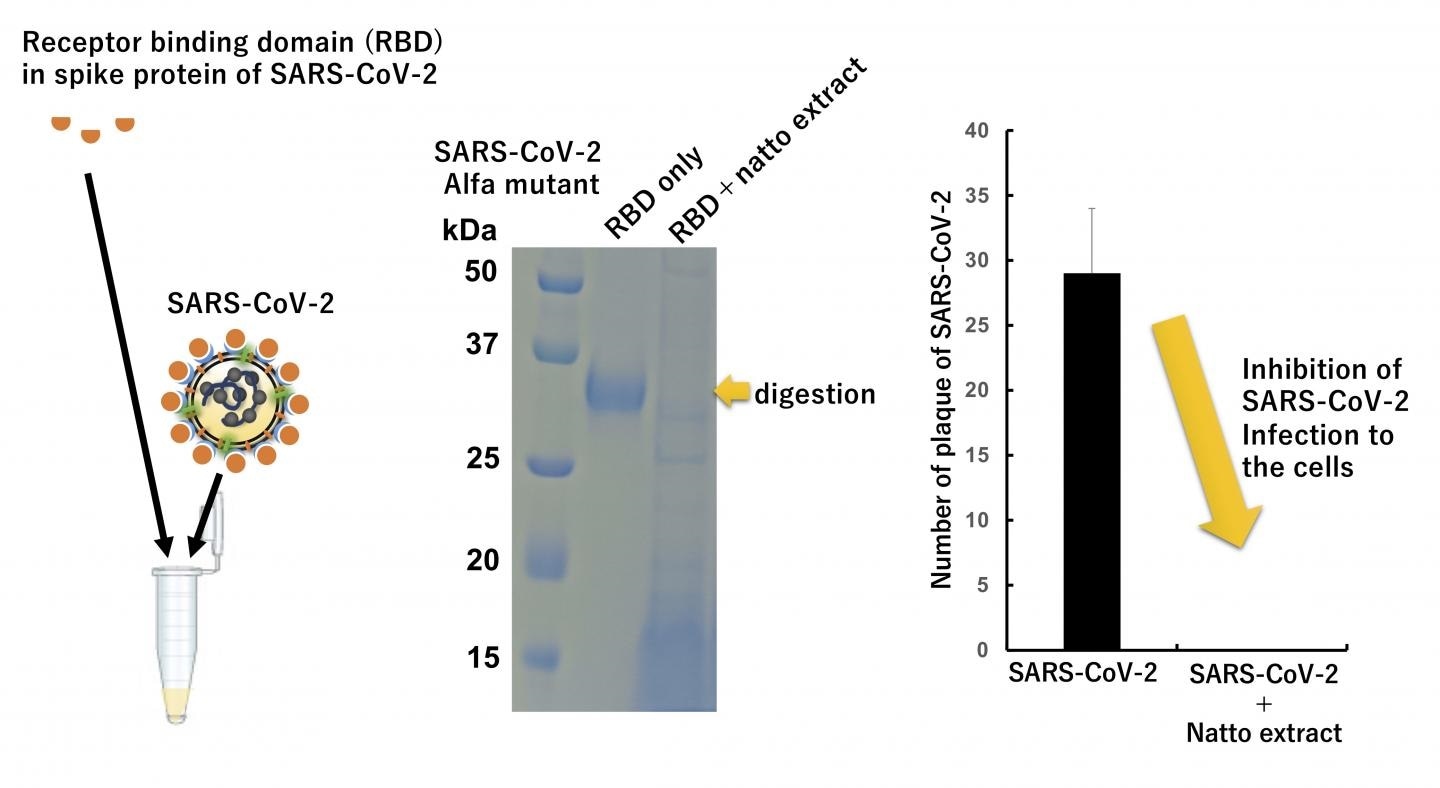Natto is a fermented soybean dish usually served for breakfast in Japan. Although it actually originated at the turn of the last millennium, it could be the key to a modern problem—COVID-19—reports a new cell-culture-based study.

Researchers from the Tokyo University of Agriculture and Technology found that an extract made from natto appears to digest the binding site of SARS-CoV-2, inhibiting the virus’s ability to infect cells. More research is needed to identify the molecular mechanism of this inhibition. Image Credit: Part of the figure is adopted from Biochemical and Biophysical Research Communications, Volume 570, 17 September 2021, Pages 21-25. © 2021 The Authors. Published by Elsevier Inc.
For a long time, natto has been considered to ensure longer, healthier lives across Japan—the country with the longest life expectancy on Earth and home to over a quarter of the world’s population aged 65 years and above. This dish was earlier identified to be a staple diet for those who were less likely to die from stroke or cardiac disease.
Scientists have now identified that extract made from the sticky, powerful-smelling natto might block the ability of the virus responsible for COVID-19 to infect cells. The study findings were published on July 13th, 2021, in Biochemical and Biophysical Research Communications.
Traditionally, Japanese people have assumed that natto is beneficial for their health. In recent years, research studies have revealed scientific evidence for this belief. In this study, we investigated natto’s antiviral effects on SARS-CoV-2, the virus that causes COVID-19, and bovine herpesvirus 1 (BHV-1), which causes respiratory disease in cattle.”
Tetsuya Mizutani, Study Author and Director of the Center for Infectious Disease Epidemiology and Prevention Research, Tokyo University of Agriculture and Technology
Natto is prepared by fermenting soybeans with Bacillus subtilis, a bacteria contained in plants and soil. The team made two natto extracts from the food, one with heat and one without. The extracts were applied to sets of lab-cultured cells from humans and cattle. The researchers infected one set with SARS-CoV-2 and the other one with BHV-1.
Upon treating with the natto extract prepared without heat, both SARS-CoV-2 and BHV-1 lost the potential to infect cells. But neither virus seemed to be affected by the heat-treated natto extract.
“We found what appears to be a protease or proteases—proteins that metabolize other proteins—in the natto extract directly digests the receptor binding domain on the spike protein in SARS-CoV-2,” stated Mizutani, suggesting that the protease seems to break down under heat, losing the potential to digest proteins and letting the virus stay infectious.
The spike protein occurs on the surface of the virus and attaches to a receptor on host cells. SARS-CoV-2 loses the ability to infect healthy cells with an inactive spike protein. The team identified a similar effect on BHV-1.
We also confirmed that the natto extract has the same digestive effects on the receptor binding domain proteins of the SARS-CoV-2 mutated strains, such as the Alpha variant,” added Mizutani.
Although the results are encouraging, Mizutani also warned that more analyses are required to determine the exact molecular mechanisms at work. He further reiterated that the study does not offer any proof of reduced viral infection only by eating natto. As soon as they identify the components and verify their functions, the researchers intend to advance their work to clinical studies in animal models.
Although there are vaccines for COVID-19, we do not know how effective they may be against every variant. It will also take time to vaccinate everyone, and there are still reports of breakthrough cases, so we need to make treatments for those who develop COVID-19. This work may offer a big hint for such pharmaceutical design.”
Tetsuya Mizutani, Study Author and Director of the Center for Infectious Disease Epidemiology and Prevention Research, Tokyo University of Agriculture and Technology
Source:
Journal reference:
Oba, M., et al. (2021) Natto extract, a Japanese fermented soybean food, directly inhibits viral infections including SARS-CoV-2 in vitro. Biochemical and Biophysical Research Communications. doi.org/10.1016/j.bbrc.2021.07.034.